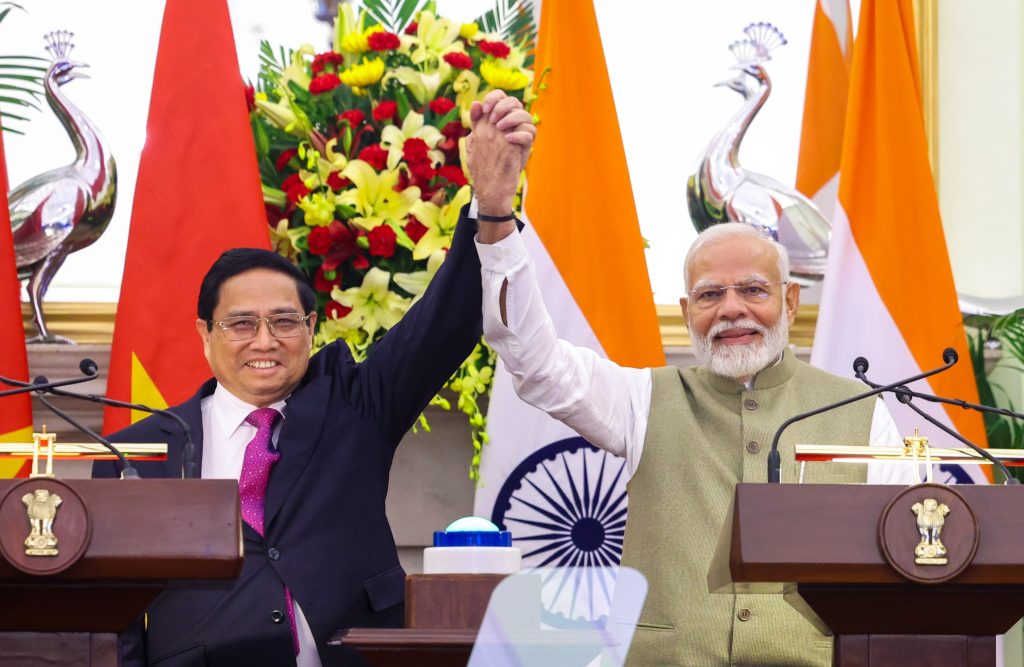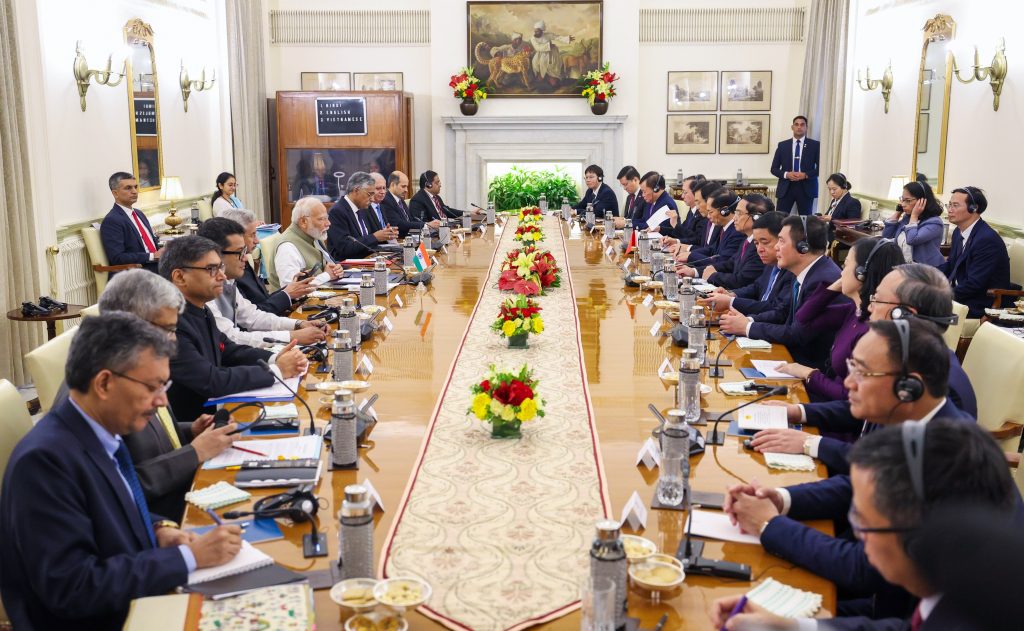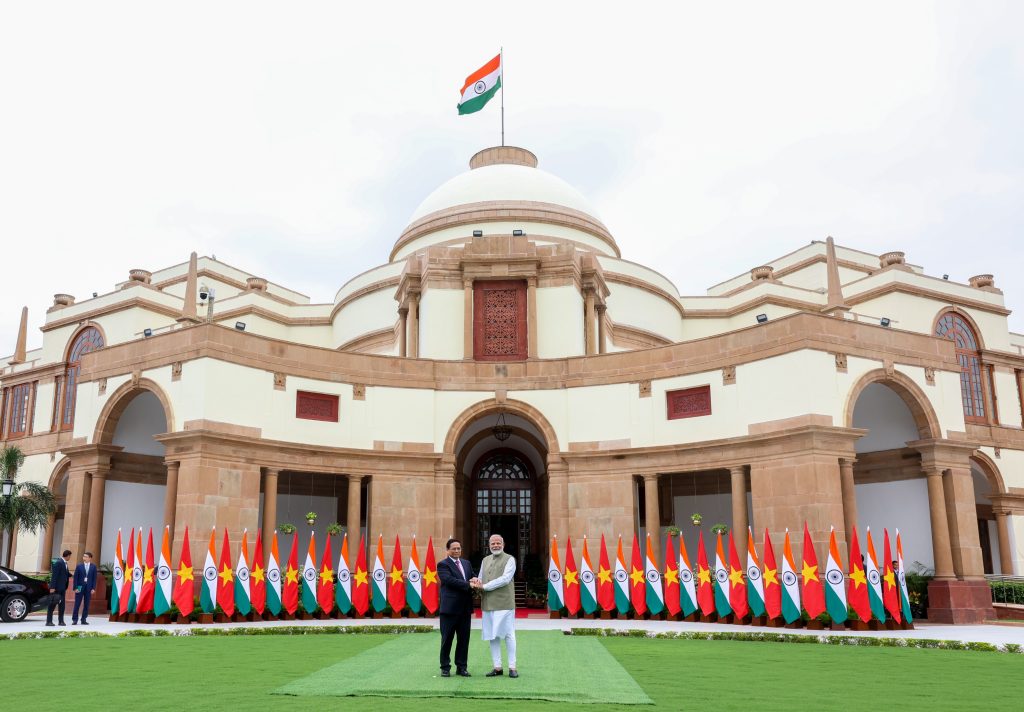
Against the backdrop of rising tensions in the South China Sea, India and Vietnam have taken their strategic partnership to the next level by enhancing cooperation in maritime security and defence for greater stability in the Indo-Pacific region. The two sides also agreed to ramp up efforts to protect freedom of navigation and overflight in the South China Sea.
Prime Minister Narendra Modi and his Vietnamese counterpart Pham Minh Chinh held wide-ranging talks in New Delhi on August 1 and discussed ways to deepen economic and defence ties between the two countries. India pledged two credit lines amounting to $300 million to boost Vietnam’s maritime security. The talks culminated in a Plan of Action for the implementation of the Comprehensive Strategic Partnership between India and Vietnam during 2024-2028 period. The leaders of India and Vietnam virtually inaugurated an Army Software Park at the Telecommunications University in Nha Trang that was built using an Indian grant of $5 million.
Boosting Trade and Tourism

Underlining synergies between India’s ‘Viksit Bharat 2047’ and Vietnam’s ‘Vision 2045,’ PM Modi spoke about rapid growth of bilateral trade between the two countries. Invoking the shared Buddhist heritage, he invited people from Vietnam to the Buddhist circuit in India. “New steps have been taken for cooperation in the field of defence and security…The agreement on a $300-million credit line will strengthen Vietnam’s maritime security,” Mr Modi said.
Looking ahead, trade and investment between India and Vietnam will move to a higher trajectory as the two sides agreed to elevate two-way trade from the current level of $15 billion and to removing trade barriers. In an important initiative, the two sides agreed to set up an economic diplomacy dialogue.
Indo-Pacific Partnership
Terming Vietnam as an “important partner” in India’s “Act East” policy and Indo-Pacific vision, Mr Modi said: “We share unison in our views regarding the Indo-Pacific region. We support evolution, not expansionism.” In a veiled allusion to Chinese assertiveness, Mr Chinh said the two sides would redouble their efforts for peace, stability and security in the South China Sea, and for the peaceful settlement of disputes based on respecting international law, especially the United Nations Convention on the Law of the Sea (UNCLOS) of 1982. “We agreed to share information and work together to make the South China Sea into the waters of peace, stability, friendship and cooperation, where safety, security and freedom of navigation and overflight is upheld,” he said.
In a lecture at the Indian Council of World Affairs, the Vietnamese leader focused on bolstering India-Vietnam cooperation in shaping an inclusive and peaceful Indo-Pacific. Alluding to India’s role as the voice of the Global South, Mr Chinh stressed that the country has an “increasingly greater role and status in the world” to contribute to peace, stability, development and prosperity.

“The Asia [and] Indo-Pacific is a locomotive for growth for the world, but it is also where major power politics are taking place fiercely. Security challenges, especially non-traditional security challenges interspersed with each other are becoming fiercer,” he said. “We are at a time where there is inter-twining of opportunities and challenges…but there are more challenges than there are opportunities,” Mr Chinh added.
Author Profile

- Manish Chand is Founder and Editor-in-Chief of India Writes Network (www.indiawrites.org) and India and World, a pioneering magazine focused on international affairs. He is CEO, Centre for Global India Insights, an India-based think tank focused on global affairs.
Latest entries
 India and the WorldFebruary 17, 2026South-by-South: Focus on people-centric solutions at India AI summit
India and the WorldFebruary 17, 2026South-by-South: Focus on people-centric solutions at India AI summit India and the WorldFebruary 7, 2026Modi hails interim India-US trade deal, Goyal says no concessions made on agriculture
India and the WorldFebruary 7, 2026Modi hails interim India-US trade deal, Goyal says no concessions made on agriculture India and the WorldFebruary 2, 2026Trump announces trade deal with India, Modi ‘delighted’
India and the WorldFebruary 2, 2026Trump announces trade deal with India, Modi ‘delighted’ India and the WorldJanuary 31, 2026Palestinian minister bats for mediatory role for India in ending Gaza conflict
India and the WorldJanuary 31, 2026Palestinian minister bats for mediatory role for India in ending Gaza conflict







